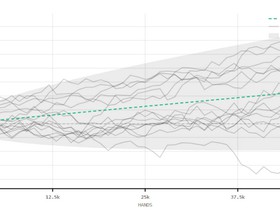- The FAIR Bet Act seeks to restore full gambling loss deductions for pro poker players.
- A 90% cap on deductions, set to start in 2026, would tax players on money they never earned.
- The bill faces tough odds in Congress, despite bipartisan support and industry backing.
- Poker community is mobilizing hopes of reversing a change that could devastate the profession.
The poker world got a lifeline this week when Representatives Dina Titus (D-NV) and Ro Khanna (D-CA) introduced the FAIR Bet Act, a targeted bill to reverse the controversial gambling tax change that threatens to devastate professional players across America.
The legislation directly challenges a provision buried in President Trump’s “One Big Beautiful Bill” that limits gamblers to deducting only 90% of their losses starting in 2026. For many poker professionals, this seemingly small change could mean the difference between profit and bankruptcy.
“I just introduced the FAIR BET Act with Rep Ro Khanna to rightfully restore the 100% tax deduction for gaming losses,” Titus posted on X. “I encourage other members to support this critical fix.”
The bill itself is remarkably simple. It amends Section 165(d) of the Internal Revenue Code by striking “90 percent” and inserting “100 percent” — essentially undoing the damage before it takes effect.
What the 90% cap means for poker players
Under current law, poker players can deduct gambling losses up to the amount of their winnings. This ensures they’re taxed only on actual profit, not gross winnings.
The new Senate provision flips this on its head. Even break-even players would owe taxes on 10% of their gross winnings — money they never actually earned.
Consider a professional who wins $500,000 and loses $500,000 over a year. Today, they’d owe zero taxes, having broken even. Under the 90% cap, they could only deduct $450,000 in losses and would pay income tax on $50,000 in phantom winnings. For high-volume tournament players, the numbers become staggering. A player with $3 million in winnings and $3 million in losses could face taxes on $300,000 in non-existent profits.
There is some ambiguity regarding what constitutes a gambling session which may lessen this burden. But for most break-even or winning players, in most situations, this will result in a much larger tax bill — potentially bigger than their annual profit.
Phil Galfond, one of the first prominent voices to sound the alarm, described the change as “much worse than anything that’s happened in poker” in recent years. He’s compared its potential impact to UIGEA and Black Friday — the two events that previously devastated the American poker landscape.
The bill faces steep political odds
Despite garnering bipartisan support from Rep. Troy Nehls (R-TX), the FAIR Bet Act faces an uphill battle in the Republican-controlled House. Titus has introduced numerous gambling-related bills in recent years, including the SAFE Bet Act in September 2024, but none have passed.
The gambling deduction cap wasn’t even in the original House version of Trump’s budget bill. It originated from a Senate Finance Committee report authored by Sen. Mike Crapo (R-ID) and was inserted during the Senate’s final vote-a-rama session on July 1.
The provision is projected to raise $1.1 billion over eight years, making it attractive to lawmakers looking for revenue sources. However, critics argue the actual revenue may fall short as the change could discourage gambling activity or push it underground.
“The black market doesn’t pay taxes, isn’t regulated, doesn’t help with problem gaming,” Titus warned in a NewsNation interview. “So it’s bad for the industry as well as for the player.”
The American Gaming Association, which represents casinos and gaming operators, has thrown its support behind the FAIR Bet Act. This marks a notable shift after the AGA supported the final version of Trump’s budget bill despite the inclusion of the gambling deduction cap.
For the millions of Americans who play poker professionally or semi-professionally, the stakes couldn’t be higher. The 90% cap takes effect in 2026, giving lawmakers limited time to act. Without intervention, many fear the provision could drive talent overseas or force players out of the game entirely.
The poker community now faces a familiar challenge: organizing political pressure to protect their livelihoods. With the FAIR Bet Act as their vehicle, players have a clear target for their advocacy efforts. The question remains whether they can generate enough momentum to overcome the political and fiscal realities facing the bill in Congress.







